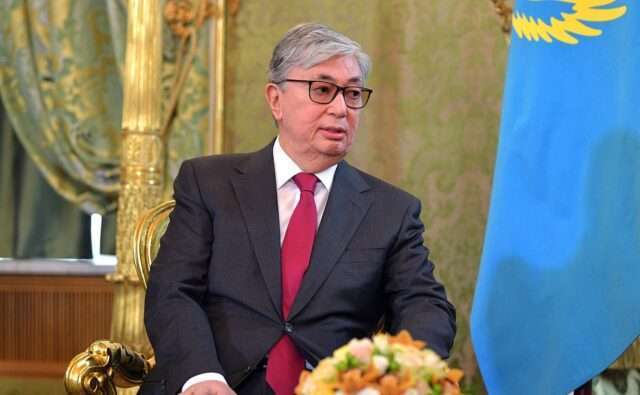
Geopolitical Report ISSN 2785-2598 Volume 24 Issue 3
Author: Silvia Boltuc
Tokayev’s suggestion to create an organisation in the framework of the CIS to promote the Russian language might be interpreted as Kazakhstan’s attempt to normalise relations and dialogue with Russia, which were downgraded due to the Ukraine conflict and the Western sanctions.
On October 7th, 2022, the leaders of the member countries of the Commonwealth of Independent States (CIS) held an informal summit in St. Petersburg, Russia.
The meeting was attended by President of Azerbaijan Ilham Aliyev, Belarusian President Alexander Lukashenko, President of Kazakhstan Kassym-Jomart Tokayev, President of Tajikistan Emomali Rakhmon, President of Turkmenistan Serdar Berdimuhamedow, President of Uzbekistan Shavkat Mirziyoyev, and Prime Minister of Armenia Nikol Pashinyan. The spokesman for the President of Kyrgyzstan, Sadyr Japarov, said earlier that the head of state would not be able to attend the summit. The event took place ahead of the CIS summit in Astana, which will kick off on October 14th,2022.
During the informal summit, the Kazakh President, Kassym-Jomart Tokayev, proposed to create an organisation in the CIS to promote the Russian language.
The current level of Russia-Kazakhstan relations
This suggestion marks a second positive sign in relations between Russia and Kazakhstan after months in which the international media reported that the two countries’ ties had reached an all-time low. Indeed, after the Russian military operation started in Ukraine, Kazakhstan was the first Collective Security Treaty Organisation (CSTO) member-state to publicly rule out sending troops to assist Moscow. In addition, on April 5th, 2022, Kazakh Foreign Minister Mukhtar Tileuberdi said that Kazakhstan would not have recognised the Donetsk and Luhansk People’s Republics as independent states.
Even harsher statements were expressed regarding the support that the Kremlin would have given Kazakh President Tokaev to keep his power in the country during the protests last January 2022. Tokayev himself, in fact, in response to those accusing him of lack of reciprocity, stated that “some people misrepresent CSTO intervention in Kazakhstan arguing that Russia saved Kazakhstan, and Kazakhstan should now forever serve and bow at the feet of Russia“. He stressed that “it was CSTO, not Russia, so this reasoning is unjustified“.
Despite Astana’s controversial stances, during the St Petersburg International Economic Forum held on June 2022, Tokayev affirmed that Russia has been and remains Kazakhstan’s key economic partner in the Eurasian Economic Union (EAEU). Kazak President stressed that given the new reality, it would be appropriate and useful to develop an innovative trade strategy within the EAEU instead of imposing counter-sanctions, which, in his opinion, are unlikely to be productive.
He added furthermore that Kazakhstan has a special plan, a programme for industrial cooperation in the new circumstances, thanks to which investors from Russia will be provided with industrial sites complete with infrastructure and a favourable investment climate. Finally, he underlined their cooperation in the agricultural field and high education.
Conclusion
The rise to power of President Tokaev marked a change in Astana’s geopolitical strategies and alliances. Despite Russia-led CSTO helping the Kazakh President maintain its position when rallies spread in the country due to high energy prices in January 2022, Tokaev seemed to take distances from Moscow.
The actual situation might be different, although international media underlined the fracture multiple times. It seems that fearing sanctions and the economic outcome of relying on isolated Russia pushed Tokaev to openly condemn the conflict in Ukraine and not recognise the newly independent republics declared by Moscow. Moreover, Astana is well aware of the 20% of the Russian minority in Kazakhstan that might ask for independence or even be annexed to Russia.
On the other side, Russia still remains Kazakhstan’s leading regional partner (imports from Russia cover more than 40 per cent of the Kazakh market’s needs) and one of the most influential actors in the EAEU, CIS, CSTO and the Shanghai Cooperation Organisation (SCO). Astana is pursuing the megaproject of Greater Eurasia, or Greater Eurasian Partnership, which can encompass the SCO, ASEAN, and the EAEU as its integral elements. In this context, good relations with Russia are imperative.
In light of the fact that Kazakh nationalists have claimed for years that Russia is trying to exert its control over Kazakhstan through Russian-language media, to the extent that some providers stopped broadcasting Russian channels accusing them of propaganda, the suggestion of President Tokayev to create an organisation in the CIS to promote the Russian language is quite significant.
Tokayev likely understood the risk of Russian minorities (the second largest ethnic group of the country) internal separatist movements and the importance of economic remittances coming from Kazakh citizens living in Russia. Moreover, Moscow and Astana are both Caspian littoral countries working on vital joint projects.
Under Tokaev’s leadership, Kazakhstan possibly preferred China as an ally as Beijing usually does not interfere in the partners’ domestic political sphere. Indeed, during his first foreign trip since 2020 to Kazakhstan, Chinese President Xi Jinping promised to support Astana in “safeguarding national independence, sovereignty and territorial integrity”.
Nevertheless, considering the upcoming election in November, the Kazakh President might need an ally to rely on to maintain his position, as happened in January 2022.
